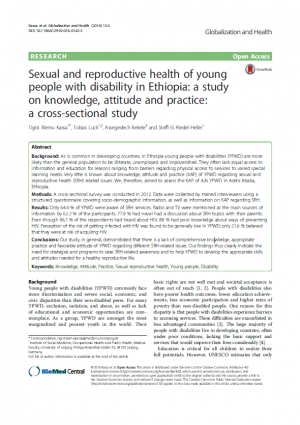Sexual and reproductive health of young people with disability in Ethiopia: a study on knowledge, attitude and practice: a cross-sectional study
As is common in developing countries, in Ethiopia young people with disabilities (YPWD) are more
likely than the general population to be illiterate, unemployed and impoverished. They often lack equal access to information and education for reasons ranging from barriers regarding physical access to services to varied special learning needs. Very little is known about knowledge, attitude and practice (KAP) of YPWD regarding sexual and reproductive health (SRH) related issues. We, therefore, aimed to assess the KAP of 426 YPWD in Addis Ababa, Ethiopia.
Methods:
A cross-sectional survey was conducted in 2012. Data were collected by trained interviewers using a
structured questionnaire covering socio-demographic information, as well as information on KAP regarding SRH.
Results:
Only 64.6 % of YPWD were aware of SRH services. Radio and TV were mentioned as the main sources of
information by 62.2 % of the participants. 77.9 % had never had a discussion about SRH topics with their parents.
Even though 96.7 % of the respondents had heard about HIV, 88 % had poor knowledge about ways of preventing
HIV. Perception of the risk of getting infected with HIV was found to be generally low in YPWD; only 21.6 % believed
that they were at risk of acquiring HIV.
Conclusions:
Our study, in general, demonstrated that there is a lack of comprehensive knowledge, appropriate
practice and favorable attitude of YPWD regarding different SRH-related issues. Our findings thus clearly indicate the
need for strategies and programs to raise SRH-related awareness and to help YPWD to develop the appropriate skills
and attitudes needed for a healthy reproductive life.
Author: Tigist Alemu Kassa, Tobias Luck, Assegedech Bekele, Steffi G. Riedel-Heller
